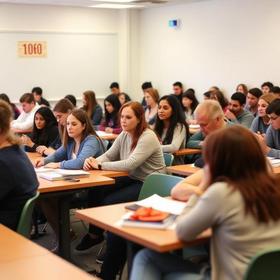- As a statewide, open-access, community college, Ivy Tech Community College provides residents of Indiana with professional, technical, transfer, and lifelong education for successful careers, personal development, and citizenship. Through its affordable, quality educational programs and services, the College strengthens Indiana's economy and enhances its cultural development.
School Highlights
Ivy Tech Community College-Wabash Valley serves 5,610 students (51% of students are full-time).
The college's student-teacher ratio of 29:1 is lower than the state community college average of 34:1.
Minority enrollment is 100% of the student body (majority Black and Hispanic), which is less than the state average of 51%.
Quick Facts (2026)
- Enrollment: 5,610 students
- In-state tuition: $3,257
- Out-state tuition: $6,761
- Student-teacher ratio: 29:1
- Source: Integrated Postsecondary Education Data System (IPEDS)
Top Rankings
Ivy Tech Community College-Wabash Valley ranks among the top 20% of public schools in Indiana for:
Category
Attribute
Affordability
School Overview
The teacher population of 192 teachers has stayed relatively flat over five years.
Ivy Tech Community College-Wabash Valley
(IN) Community College Avg.
Carnegie Classification
Associate's--Public Rural-serving Large
Baccalaureate Colleges: Arts & Sciences Focus
Institution Level
Less than 2 yrs
Four or more years
Institution Control
Public
Private, for profit
Total Faculty
192 staff
145 staff
School Calendar
Student Body
The student population of Ivy Tech Community College-Wabash Valley has stayed relatively flat over five years.
The student-teacher ratio of 29:1 has stayed the same over five years.
The Ivy Tech Community College-Wabash Valley diversity score of 0.00 is less than the state average of 0.65. The school's diversity has declined by 100% over five years.
Total Enrollment
5,610 students
3,848 students
Student-Teacher Ratio
29:1
34:1
# Full-Time Students
2,845 students
1,083 students
# Part-Time Students
2,765 students
2,765 students
# Enrollment Undergraduate
n/a
289 students
# Full-Time Undergraduate Students
5,610 students
1,548 students
# Full-Time Graduate Students
n/a
5,260 students
# Part-Time Undergraduate Students
n/a
180 students
# Part-Time Graduate Students
n/a
35 students
Total Dormitory Capacity
n/a
196 students
% American Indian/Alaskan
n/a
1%
% Asian
n/a
2%
% Hispanic
n/a
4%
% Black
n/a
9%
% White
n/a
49%
% Two or more races
n/a
3%
% Unknown races
100%
32%
Diversity Score
n/a
0.65
College Completion Rate (Students who graduate in less than 4 years) (Year 2010)
8%
10%
College Completion Rate (Students who graduate in 4 years or more than 4 years)
n/a
33%
Average Graduate Earnings (10 Years) (Year 2010)
$28,500
$30,200
Tuition and Acceptance Rate
The public in-state tuition of $3,257 is less than the state average of $3,695. The in-state tuition has grown by 15% over four years.
The public out-state tuition of $6,761 is less than the state average of $7,846. The out-state tuition has grown by 19% over four years.
In-State Tuition Fees
$3,257
$3,695
Out-State Tuition Fees
$6,761
$7,846
% Students Receiving Some Financial Aid
40%
56%
Median Debt for Graduates (Year 2010)
$13,027
$12,605
Median Debt for Dropouts (Year 2010)
$5,500
$5,500
Acceptance Rate
n/a
74%
SAT Reading
n/a
485
SAT Math
n/a
485
SAT Writing
n/a
465
ACT Composite
n/a
22
ACT English
n/a
21
ACT Math
n/a
21
Source: 2023 (or latest year available) Integrated Postsecondary Education Data System (IPEDS)
School Notes
- The Wabash Valley Region offers courses and programs at the South Highway 41 Campus, the Airport Campus, the Martin Luther King Center, the Sullivan Learning Center, and the Greencastle Campus. Courses are also offered at Learning Centers including Clinton, Rockville, and White River Valley High School. Ivy Tech Community College - Wabash Valley Region opened its doors in 1968 and serves students in Clay,Parke, Putnam, Sullivan, Vermillion, Vigo and part of Greene counties. Ivy Tech Community College - Wabash Valley Region has one regional campus and a number of off-campus locations such as hospitals, businesses, industries, high schools, and agencies offering credit and non-credit courses. The College offers courses of study for Technical Certificates (one-year programs that develop competency in a technical skill), Associate of Applied Science Degrees (two-year programs that provide both depth and breadth in conceptual and operational skills in a technical field) and Associate of Science Degrees (two-year programs that emphasize cognate skills as well as technical skills. Some colleges will accept some of this credit toward a four-year Bachelor degree) in a number of program areas. The College also provides continuing education, business and industry training and other services through its Corporate and Community Services Area. The Wabash Valley Region provides extensive Continuing Education offerings, as well as customized training and education for area business and industry. The Corporate and Continuing Education Department, located at the Airport Campus, provides many assessment and training services to the citizens and businesses of the Greater Terre Haute area. Ivy Tech Community College - Wabash Valley Region is accredited by the North Central Association of Colleges and Schools.
Frequently Asked Questions
How much does Ivy Tech Community College-Wabash Valley cost?
Ivy Tech Community College-Wabash Valley's tuition is approximately $3,257 for In-State students and $6,761 for Out-State students.
What schools are Ivy Tech Community College-Wabash Valley often compared to?
Ivy Tech Community College-Wabash Valleyis often viewed alongside schools like Vincennes University by visitors of our site.
What is Ivy Tech Community College-Wabash Valley's ranking?
Ivy Tech Community College-Wabash Valley ranks among the top 20% of community college in Indiana for: Least expensive tuition and Average community college minority breakdown.
Recent Articles

Part-Time vs. Full-Time Enrollment in 2025: Which Is Better?
Explore part-time vs. full-time enrollment in 2025, comparing costs, flexibility, outcomes, and goals to help students choose the right path.

How Community Colleges Use AI Tools to Support Student Success
Explore how community colleges are using AI tools in 2025 to improve advising, learning, retention, and student success.

Nontraditional Student’s Guide to Community College 2025
Comprehensive guide for nontraditional students at community college with updated tuition, support, careers, and success strategies for 2025.






